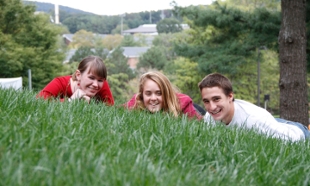Learning Where You Live
Being the Change
Residential Learning Communities connect JMU students and professors with similar interests
By Paula Polglase

Amanda Kuhnley (‘11) enjoys merging her art history and integrated science and technology majors in JMU’s “collaborative academic environment.”
Imagine if your walk to class didn’t involve a sprint across campus but was downstairs in your residence hall. Imagine taking a field trip with your hall mates, hiking with your professor, learning how to teach the physics of roller coasters or learning how to say “good morning” in Chinese from your roommate.
JMU freshmen don’t have to imagine these types of Madison Experiences. First–year students at JMU have the unique option of participating in a Residential Learning Community. Learning communities offer students the benefit of connecting with a small group of students and professors with similar interests. JMU learning communities focus on different themes but offer many similar opportunities. A faculty coordinator organizes each learning community and students take a joint class related to the academic focus of the learning community.
An automatic niche
“Learning communities create an automatic niche for students with similar academic interests,” says Kathleen Campbell, associate director in the Office of Residence Life. She adds, “Students who participate in a JMU Residential Learning Community are very positive about their experiences.”
Eight JMU learning communities include experiences for pre–professional health students, students interested in other cultures, psychology majors, education majors, biology majors, students majoring in the visual and performing arts, and Honors Program students.
Beyond the shared classes, students participate in field trips, community activities and unique academic experiences. Last year, learning community residents shared trips to the Baltimore Aquarium, the Smithsonian’s National Zoological Park in Washington, D.C., and Kings Dominion. They also sponsored community dinners, themed parties and completed volunteer projects for Harrisonburg and Rockingham County agencies.
Courtney Waldmann (‘13), an interdisciplinary liberal education major from Eastchester, N.Y., lived in the Roop Learning Community for education majors during her freshman year and stayed involved as a sophomore. She says she met some of her best friends through the Roop Learning Community. “Roop has a Big/Little component,” says Waldmann. “Freshmen are paired with sophomores to help ease their transition to college. I truly loved being a ‘Little’ and a ‘Big’ community member.’
Involved faculty
Faculty involvement is at the heart of JMU’s residential learning communities. Each faculty coordinator plans out the academic and programmatic experience for students. Campbell has been impressed with the professors who get involved as learning coordinators. “These faculty members are passionate. They are particularly concerned with this group of students and their academic successes.”
Waldmann says, “I have the best relationship with Roop faculty coordinator Dr. Cindy Klevickis. She is a wonderful teacher and always encourages us to pursue our goals. I know I can always turn to her if I need help with anything.”
Honors Program Director Barry Falk and his staff have worked hard to develop the Honors Program outside of the classroom, creating a built–in sense of community that shapes honors students’ Madison Experience.
For most first–year honors students a built–in sense of community starts where they live, in the Honors Living and Learning Center housed in Shenandoah Hall. This community brings together 200 first–year honors students from all majors to create an intellectual culture within the Honors Program.
“I was constantly surrounded by people who were just like me, in that they worked very hard for classes,” says biology major Seana Sears (‘13) of Round Hill, Va. “Living with all of these amazing, intelligent people made my transition from high school to college that much better.”
Incoming freshmen who have been admitted to the JMU Honors Program are expected, but not required, to live in the honors residence hall. Although all honors students do not take a shared class, there is a faculty in–residence in Shenandoah Hall and additional programming focused on intellectual engagement.
Great success with the honors hall has sparked high retention rates in the Honors Program and led to the expansion of the program within Shenandoah Hall. “We’ve occupied half of another wing and hope to grow more,” says Falk.
